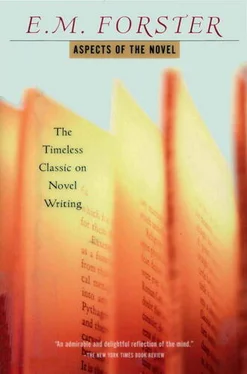Let us examine at some length another book oi the rigid type, a book with a unity, and in this sense an easy book, although it is by Henry James. We shall see in it pattern triumphant, and we shall also, be able to see the sacrifices an author must make if he wants his pattern and nothing else to triumph.
The Ambassadors, like Thais, is the shape of an hour-glass. Strether and Chad, like Paphnuce and Thais, change places, and it is the realization of this that makes the book so satisfying at the close. The plot is elaborate and subtle, and proceeds by action or conversation or meditation through every paragraph. Everything is planned, everything fits; none of the minor characters are just decorative like the talkative Alexandrians at Nicias' banquet; they elaborate on the main theme, they work. The final effect is pre-arranged, dawns gradually on the reader, and is completely successful when it comes. Details of intrigue, of the various missions from America, may be forgotten, but the symmetry they have created is enduring.
Let us trace the growth of this symmetry. [9] There is a masterly analysis of The Ambassadors from an other standpoint in The Craft of Fiction.
Strether, a sensitive middle-aged American, is commissioned by his old friend, Mrs. Newsome, whom he hopes to marry, to go to Paris and rescue her son Chad, who has gone to the bad in that appropriate city. The Newsomes are sound commercial people, who have made money over manufacturing a small article of domestic utility. Henry James never tells us what the small article is, and in a moment we shall understand why. Wells spits it out in Tono Bungay, Meredith reels it out in Evan Harrington, Trollope prescribes it freely for Miss Dunstable, but for James to indicate how his characters made their pile—it would not do. The article is somewhat ignoble and ludicrous—that is enough. If you choose to be coarse and daring and visualize it for yourself as, say, a button-hook, you can, but you do so at your own risk: the author remains uninvolved.
Well, whatever it is, Chad Newsome ought to come back and help make it, and Strether undertakes to fetch him. He has to be rescued from a life which is both immortal and unremunerative.
Strether is a typical James character—he recurs in nearly all the books and is an essential part of their construction. He is the observer who tries to influence the action, and who through his failure to do so gains extra opportunities for observation. And the other characters are such as an observer like Strether is capable of observing—through lenses procured from a rather too first-class oculist. Everything is adjusted to his vision, yet he is not a quietist—no, that is the strength of the device; he takes us along with him, we move as well as look on.
When he lands in England (and a landing is an exalted and enduring experience for James, it is as vital as Newgate for Defoe; poetry and life crowd round a landing): when Strether lands, though it is only old England, he begins to have doubts of his mission, which increase when he gets to Paris. For Chad Newsome, far from going to the bad, has improved; he is distinguished, he is so sure of himself that he can be kind and cordial to the man who has orders to fetch him away; his friends are exquisite, and as for "women in the case" whom his mother anticipated, there is no sign of them whatever. It is Paris that has enlarged and redeemed him—and how well Strether himself understands this!
His greatest uneasiness seemed to peep at him out of the possible impression that almost any acceptance of Paris might give one's authority away. It hung before him this morning, the vast bright Babylon, like some huge iridescent object, a jewel brilliant and hard, in which parts were not to be discriminated nor differences comfortably marked. It twinkled and trembled and melted together; and what seemed all surface one moment seemed all depth the next. It was a place of which, unmistakably, Chad was fond; wherefore, if he, Strether, should like it too much, what on earth, with such a bond, would become of either of them?
Thus, exquisitely and firmly, James sets his atmosphere—Paris irradiates the book from end to end, it is an actor though always unembodied, it is a scale by which human sensibility can be measured, and when we have finished the novel and allow its incidents to blur that we may see the pattern plainer, it is Paris that gleams at the centre of the hour-glass shape—Paris—nothing so crude as good or evil. Strether sees this soon, and sees that Chad realizes it better than he himself can; and when he has reached this stage of initiation the novel takes aturn: there is, after all, a woman in the case; behind Paris, interpreting it for Chad, is the adorable and exalted figure of Mme. de Vionnet. It is now impossible for Strether to proceed. All that is noble and refined in life concentrates in Mme. de Vionnet and is reinforced by her pathos. She asks him not to take Chad away. He promises—without reluctance, for his own heart has already shown him as much—and he remains in Paris not to fight it but to fight for it.
For the second batch of ambassadors now arrives from the New World. Mrs. Newsome, incensed and puzzled by the unseemly delay, has dispatched Chad's sister, his brother-in-law, and Mamie, the girl whom he is supposed to marry. The novel now becomes, within its ordained limits, most amusing. There is a superb set-to between Chad's sister and Mme. de Vionnet, while as for Mamie—here is disastrous Mamie, seen as we see all things, through Strether's eyes.
As a child, as a "bud," and then again as a flower of expansion, Mamie had bloomed for him, freely, in the almost incessantly open doorways of home; where he remembered her at first very forward, as then very backward—for he had carried on at one period, in Mrs. Newsome's parlours, a course of English literature reinforced by exams and teas—and once more, finally, as very much in advance. But he had kept no great sense of points of contact; it not being in the nature of things at Woollett that the freshest of the buds should find herself in the same basket with the most withered of the winter apples. ... He none the less felt now, as he sat with the charming girl, the signal growth of a confidence. For she was charming, when all was said, and none the less so for the visible habit and practice of freedom and fluency. She was charming, he was aware, in spite of the fact that if he hadn't found her so he would have found her something he should have been in peril of expressing as "funny." Yes, she was funny, wonderful Mamie, and without dreaming it; she was bland, she was bridal—with never, that he could make out as yet, a bridegroom to support it; she was handsome and portly, and easy and chatty, soft and sweet and almost disconcertingly reassuring. She was dressed, if we might so far discriminate, less as a young lady than as an old one—had an old one been supposable to Strether as so committed to vanity; the complexities of her hair missed moreover also the looseness of youth; and she had a mature manner of bending a little, as to encourage and reward, while she held neatly in front of her a pair of strikingly polished hands: the combination of all of which kept up about her the glamour of her "receiving," placed her again perpetually between the windows and within sound of the ice cream plates, suggested the enumeration of all the names, gregarious specimens of a single type, she was happy to "meet."
Mamie! She is another Henry James type; nearly every novel contains a Mamie—Mrs. Gereth in The Spoils of Poynton for instance, or Henrietta Stack-pole in The Portrait of a Lady. He is so good at indicating instantaneously and constantly that a character is second-rate, deficient in sensitiveness, abounding in the wrong sort of worldliness; he gives such a character so much vitality that its absurdity is delightful.
Читать дальше












